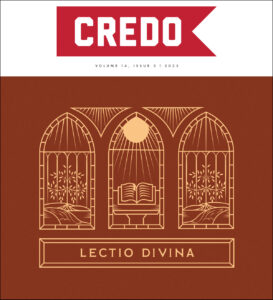Much can be learned about meditation by paying close attention to what the Bible itself has to say on the subject. The Latin terms meditari and meditatio translate the Hebrew word hagah, “to contemplate, to talk, to mumble.” Hagah refers not merely to a mental process, but also to an audible phenomenon—a murmuring or muttering of words under one’s breath or sotto voce. In one biblical text the Hebrew word refers to the cooing of a dove (Isa. 38:14). This is not of course the usual mental image of a meditating monk, kneeling in a chapel in absolute silence. One notices too that the biblical instruction given to Joshua implies a spoken and audible word: “This book of the law shall not depart out of your mouth; you shall meditate on it day and night, so that you may be careful to act in accordance with all that is written in it. For then you shall make your way prosperous, and then you shall be successful” (Josh. 1:8). The text does not say that the book should not depart from Joshua’s “mind,” but not from his “mouth.” In other words, Joshua was constantly to be speaking God’s word aloud to himself or to others.
The book of Deuteronomy gave such instruction not only to Israel’s leader, but to the whole nation, who were to “recite them [i.e., the biblical words] to your children and talk about them when you are at home and when you are away, when you lie down and when you rise” (Deut. 6:7). The Israelites were to be gossiping the good news of God wherever they went and during their daily chores. The “meditation” on God’s written word in Psalm 1 and other texts thus denotes “the half-audible murmur of a person who is praying.”[1] Such meditative recitation was multidimensional. It involved not only seeing written words on a page, but also the speaking of those words, and the hearing of the words thus spoken. It involved a thinking mind, a feeling heart, a speaking mouth, and a listening ear. No wonder that the written scroll of God’s word is presented in Scripture to the prophet as something to chew and swallow (Ezek. 3:1–4; Rev. 10:8–11). The command to “eat this scroll” indicates that God’s word must be consumed and digested to yield its full effect and benefit.
Meditation in scripture is connected to specific times—occurring “in the night” (Ps. 63:7; 77:7), and yet stretching through “day and night” (Josh. 1:8; Ps. 1:2). The subject or content of meditation may be God himself (Ps. 63:7), the works of God’s hands in nature (Ps. 143:5), God’s deeds in history (Ps. 77:13; 143:5), God’s justice (Ps. 35:28; 71:24), or God’s miracles (Ps. 105:2; 119:27; 145:5). As noted already, the written scripture or some portion thereof is often a focus of meditation (Josh. 1:8; Ps. 1:2; Ps. 119:15, 23, 48, 78, 97, 148). A number of psalms link meditation with remembrance (Ps. 63:7; 77:4, 7,1 2; 143:5). In Psalm 77, there is a shift from lamentation (vv. 1–10), toward the praise of God (vv. 12–21), through the remembrance of, and meditation on, God’s past deeds (vv. 12–13). In Psalm 143, the psalmist’s meditations on God’s former deeds and God’s creation of the world bring a transition from lamentation (vv. 2–4), to pleading with God (vv. 6–10), and finally to a confession of confidence in God (vv. 10–12). Psalm 1, writes Kathrin Liess, is “a beatitude of the praying person who constantly ‘mumblingly’ recites . . . the Torah and internalizes it so much that their life’s journey succeeds.” Psalm 1 is a preamble to the entire book of Psalms and has “programmatic significance for the book of Psalms as a whole, since this introductory Psalm instructs the reader to read the Psalms from a ‘meditative’ perspective.” In this way the Psalms are “a ‘book of meditation,’ to be meditated upon and read in a specific way called lectio continua in the monastic tradition.” Whether gradually or suddenly, in a shock of recognition, one sees that the biblical words do not pertain merely to a time and place there-and-then, but also to the here-and-now, and to one’s own life situation. Share on X
Lectio brings faithful readers into an awareness of the “now-ness” of God and God’s Word. Whether gradually or suddenly, in a shock of recognition, one sees that the biblical words do not pertain merely to a time and place there-and-then, but also to the here-and-now, and to one’s own life situation. The Gospel of Luke records that when Jesus came to preach in his hometown of Nazareth, he chose a passage from the book of Isaiah on the preaching of good news to the poor, and he surprised his hearers by saying: “Today this Scripture has been fulfilled in your hearing” (Luke 4:21). God’s word is “fulfilled,” Jesus says, “today.” Those who are gripped by the force of God’s word are faced with a choice: they may say no as well as yes to what they hear. The Old Testament warns: “Today, if you hear his voice, do not harden your hearts” (Ps. 97:7–8). The word today once again is a reminder that God’s word causes the hearer to experience its power and pertinence in the present. Jesus’s words have lost none of their force since he spoke them, and so Jesus is a contemporary to everyone who is alive today. His call to “follow me,” and his summons for hearers of the word to become disciples of the word, is not limited to his own time but applies to all persons of all times and all places. It is the task of lectio divina to bring to the awareness of the person the “here-ness” and “now-ness” of God’s Word.
Endnotes
[1] Kathrin Liess, “Meditate, Meditation,” in Christine Helmer et al., eds., Encyclopedia of the Bible and Its Reception; Volume 18 (Berlin: Walter de Gruyter, 2020), cols. 421–23, citing 422.
Material in this article is adapted from the forthcoming book by Michael McClymond, Martyrs, Monks, and Mystics: An Introduction to Christian Spirituality (Mahwah, NJ: Paulist Press, 2023). Copyright 2023 Paulist Press. Used by Permission.


